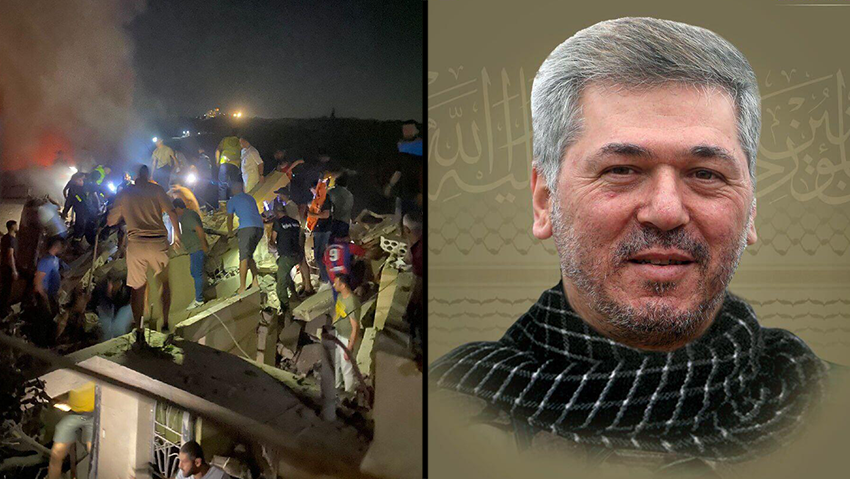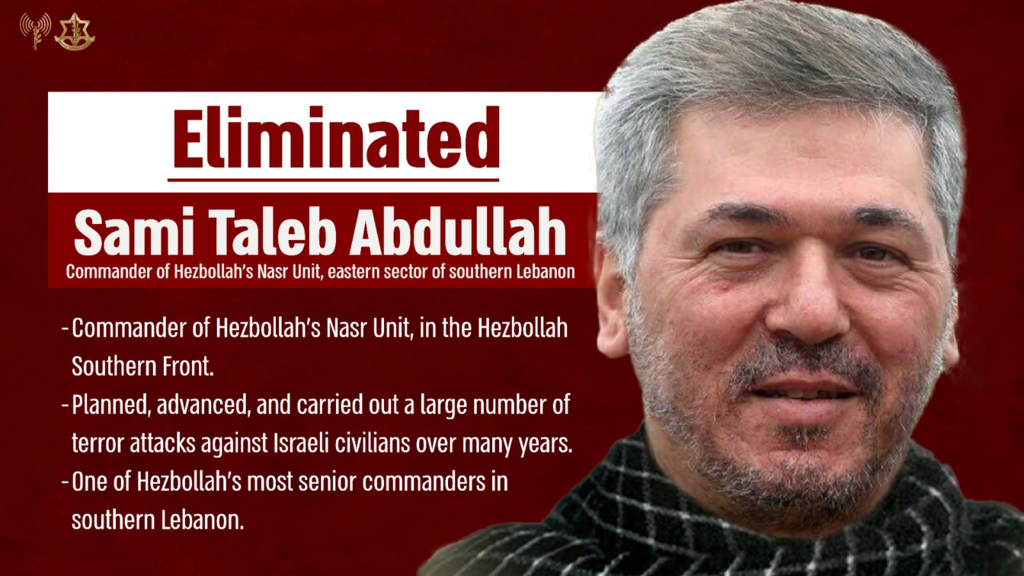Getting your Trinity Audio player ready...
Taleb Sami Abdallah, the commander of Hezbollah's Nasr unit, was killed overnight Wednesday along with three other commanders in an Israeli strike near the Lebanese city of Tyre.
The IDF confirmed in a statement Wednesday that Abdallah, described as "one of Hezbollah's most senior commanders in southern Lebanon" was eliminated in an Israeli Air Force strike on a "Hezbollah command and control center in the area of Jouaiyya in southern Lebanon, which was used to direct terror attacks against Israeli territory from southeastern Lebanon in recent months."
IDF strike on high-ranking Hezbollah commander Taleb Abdallah
(Video: IDF Spokesperson’s Unit)
According to the army, "[f]or many years, the terrorist planned, advanced, and carried out a large number of terror attacks against Israeli civilians. Three additional Hezbollah terrorist operatives were also eliminated in the strike.
Known by his call sign Abu Taleb, Abdallah was considered by the IDF one of Hezbollah's most experienced and senior field commanders, equivalent to the IDF rank of brigadier general within the organization. His elimination is seen as one of the most significant since October 7.
While Hezbollah quickly appoints replacements for eliminated officers, the IDF notes that the death of a senior field commander like Abdallah is likely to impact Hezbollah's ability to launch attacks from the sector he oversaw.
Since 2016, Abdallah commanded the Nasr unit's eastern sector of southern Lebanon, one of three sectors, from which rockets were fired at the Upper Galilee and Golan Heights in recent months. He reported directly to Hezbollah's southern front commander.
He was killed around 10 PM Tuesday, along with his chief of staff and two other operatives, in a precise fighter jet strike following intelligence from the IDF’s Military Intelligence Directorate (Aman) and Northern Command. At the time of the strike, he was in his command post after ordering rocket fire toward Kfar Blum earlier in the evening.
The 55-year-old was described by the IDF as having "extensive operational knowledge and experience." He led the attempted kidnapping of soldiers in the border village of Ghajar in 2005 and a series of retaliatory attacks in the Upper Galilee and Mount Dov in recent years, including the killing of Givati soldiers in January 2015 in response to the assassination of Jihad Mughniyeh, son of the organization's powerful military commander Imad Mughniyeh, in the Syrian Golan.
3 View gallery


Abdallah (right) with Qassem Soleimani, commander of Iran's elite Quds Force eliminated by US in 2020
During the Second Lebanon War, he commanded the Bint Jbeil Brigade, involved in heavy fighting against Egoz fighters in Maroun al-Ras in the summer of 2006. Recently, he oversaw rocket fire in the Ramim Ridge and Kiryat Shmona areas and spearheaded the development and production of heavy rockets, including the Burkan.
Despite the IDF acknowledging his elimination as the most significant Hezbollah figure killed since October 7, the military emphasized that no decision has been made to expand operations against Hezbollah or launch a major offensive against the Shiite terrorist organization. Such a decision, which the IDF recommends, would be made at the political level if necessary.
The IDF expects Hezbollah to maintain a "military vs. military" approach, targeting military or security objectives. Hezbollah claimed to have hit the Plasan protective equipment factory in Kibbutz Sasa with anti-tank missiles Wednesday morning.
Lebanese footage of strikes in southern Lebanon's Jouaiyya
Meanwhile, Lebanese media also described Abdallah as "the most senior Hezbollah commander eliminated since the beginning of the war."
Hezbollah-affiliated Lebanese newspaper Al Akhbar wrote about the dramatic assassination, "The enemy dealt a severe blow to Hezbollah in a security-military operation targeting one of the prominent commanders in the current confrontation, accompanied by additional fighters during an Israeli drone strike on a house in the village of Jouaiyya." The article described the assassination as "a dangerous escalation by the enemy, opening the door to a different management of the conflict."
Arab media reports overnight claimed that alongside Abdallah, three other Hezbollah commanders were killed in the strike. The Shiite terrorist organization confirmed the deaths of Ali Salim Sufan, Hussein Qassem Hmeid (call sign Sajid) and Mohammed Hussein Sabra. According to Saudi channel Al Hadath, Abdallah was the highest-ranking among them.
3 View gallery


Aftermath of Israeli-linked strike in Jouaiyya; high-ranking Hezbollah commander Taleb Sami Abdallah, known by his call sign Abu Taleb
Reuters quoted a Lebanese official who said Abu Taleb was the most senior Hezbollah operative killed in eight months of conflict. Lebanese security sources emphasized that Abu Taleb outranked Wissam al-Tawil, a high-ranking commander of Hezbollah's elite Radwan Force, who was killed by Israel in January.
According to past reports, the Nasr unit commanded by Abu Taleb operates in southern Lebanon, from the Israeli border up to the Litani River. Sources who spoke to Reuters said he commanded the central sector in the border area. While Hezbollah did not confirm the various reports, they did announce his death on Tuesday.
Sky News Arabia reported that three missiles hit a house in Jouaiyya, killing four senior Hezbollah commanders.
The overnight assassination prompted unprecedented rocket barrages targeting northern Israeli communities, including Safed and Tiberias, with over 160 rockets fired.
Heavy rocket fire from Lebanon intercepted over northern Israel
(Video: Miki Shamka )
Fires break out near Tiberias following Hezbollah rocket fire
(Video: Avihu Shapira )
Hours after reports of the dramatic strike in Lebanon, more than 200 rockets were launched at northern communities. Sirens continuously disrupted the holiday peace across the Galilee as Israelis celebrated the festival of Shavuot, and for the first time since October, a siren was activated in Tiberias. In the town of Sasa, a direct hit was reported on a building, while other rockets exploded in unpopulated areas across the Galilee, causing fires in some locations.
In response to the heavy barrages, Israeli fighter jets struck four Hezbollah terror targets in the Yatar area of southern Lebanon, from where earlier rockets had been launched at northern Israel.
Meanwhile, fighter jets targeted an additional launcher in the Haneen area of southern Lebanon, which had also been used for launches earlier in the day. Additionally, IDF artillery struck the sources of rocket fire toward the border town of Zar'it.
First published: 13:28, 06.12.24






